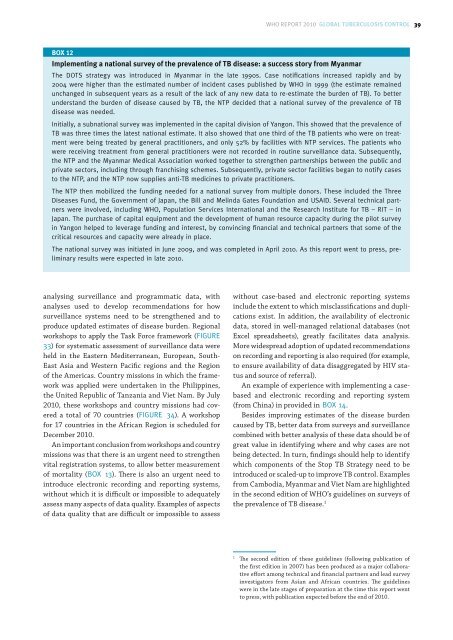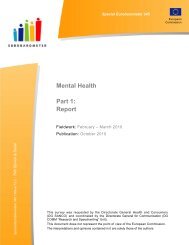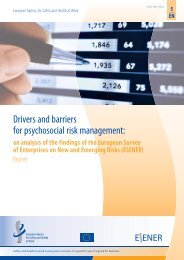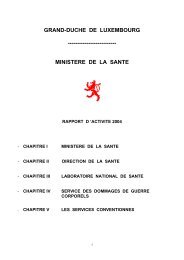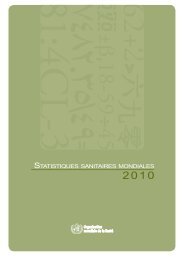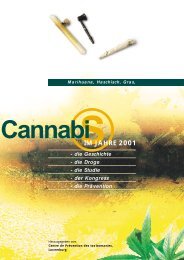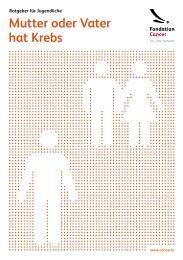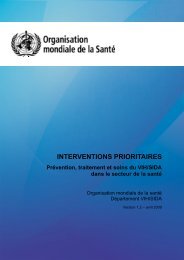Global Tuberculosis Control 2010 - Florida Department of Health
Global Tuberculosis Control 2010 - Florida Department of Health
Global Tuberculosis Control 2010 - Florida Department of Health
You also want an ePaper? Increase the reach of your titles
YUMPU automatically turns print PDFs into web optimized ePapers that Google loves.
analysing surveillance and programmatic data, with<br />
analyses used to develop recommendations for how<br />
surveillance systems need to be strengthened and to<br />
produce updated estimates <strong>of</strong> disease burden. Regional<br />
workshops to apply the Task Force framework (<br />
) for systematic assessment <strong>of</strong> surveillance data were<br />
held in the Eastern Mediterranean, European, South-<br />
East Asia and Western Pacific regions and the Region<br />
<strong>of</strong> the Americas. Country missions in which the framework<br />
was applied were undertaken in the Philippines,<br />
the United Republic <strong>of</strong> Tanzania and Viet Nam. By July<br />
<strong>2010</strong>, these workshops and country missions had covered<br />
a total <strong>of</strong> 70 countries ( ). A workshop<br />
for 17 countries in the African Region is scheduled for<br />
December <strong>2010</strong>.<br />
An important conclusion from workshops and country<br />
missions was that there is an urgent need to strengthen<br />
vital registration systems, to allow better measurement<br />
<strong>of</strong> mortality ( ). There is also an urgent need to<br />
introduce electronic recording and reporting systems,<br />
without which it is difficult or impossible to adequately<br />
assess many aspects <strong>of</strong> data quality. Examples <strong>of</strong> aspects<br />
<strong>of</strong> data quality that are difficult or impossible to assess<br />
without case-based and electronic reporting systems<br />
include the extent to which misclassifications and duplications<br />
exist. In addition, the availability <strong>of</strong> electronic<br />
data, stored in well-managed relational databases (not<br />
Excel spreadsheets), greatly facilitates data analysis.<br />
More widespread adoption <strong>of</strong> updated recommendations<br />
on recording and reporting is also required (for example,<br />
to ensure availability <strong>of</strong> data disaggregated by HIV status<br />
and source <strong>of</strong> referral).<br />
An example <strong>of</strong> experience with implementing a casebased<br />
and electronic recording and reporting system<br />
(from China) in provided in.<br />
Besides improving estimates <strong>of</strong> the disease burden<br />
caused by TB, better data from surveys and surveillance<br />
combined with better analysis <strong>of</strong> these data should be <strong>of</strong><br />
great value in identifying where and why cases are not<br />
being detected. In turn, findings should help to identify<br />
which components <strong>of</strong> the Stop TB Strategy need to be<br />
introduced or scaled-up to improve TB control. Examples<br />
from Cambodia, Myanmar and Viet Nam are highlighted<br />
in the second edition <strong>of</strong> WHO’s guidelines on surveys <strong>of</strong><br />
the prevalence <strong>of</strong> TB disease. 1<br />
1<br />
The second edition <strong>of</strong> these guidelines (following publication <strong>of</strong><br />
the first edition in 2007) has been produced as a major collaborative<br />
effort among technical and financial partners and lead survey<br />
investigators from Asian and African countries. The guidelines<br />
were in the late stages <strong>of</strong> preparation at the time this report went<br />
to press, with publication expected before the end <strong>of</strong> <strong>2010</strong>.


